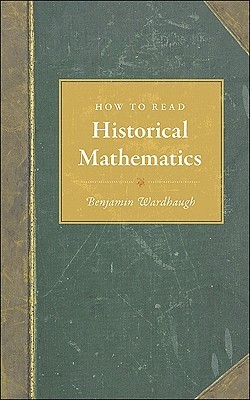
- We will send in 10–14 business days.
- Author: Benjamin Wardhaugh
- Publisher: Princeton University Press
- ISBN-10: 0691140146
- ISBN-13: 9780691140148
- Format: 13 x 20.6 x 1.5 cm, kieti viršeliai
- Language: English
- SAVE -10% with code: EXTRA
Reviews
Description
Techniques for deciphering texts by early mathematicians
Writings by early mathematicians feature language and notations that are quite different from what we're familiar with today. Sourcebooks on the history of mathematics provide some guidance, but what has been lacking is a guide tailored to the needs of readers approaching these writings for the first time. How to Read Historical Mathematics fills this gap by introducing readers to the analytical questions historians ask when deciphering historical texts. Sampling actual writings from the history of mathematics, Benjamin Wardhaugh reveals the questions that will unlock the meaning and significance of a given text--Who wrote it, why, and for whom? What was its author's intended meaning? How did it reach its present form? Is it original or a translation? Why is it important today? Wardhaugh teaches readers to think about what the original text might have looked like, to consider where and when it was written, and to formulate questions of their own. Readers pick up new skills with each chapter, and gain the confidence and analytical sophistication needed to tackle virtually any text in the history of mathematics.- Introduces readers to the methods of textual analysis used by historians
- Uses actual source material as examples
- Features boxed summaries, discussion questions, and suggestions for further reading
- Supplements all major sourcebooks in mathematics history
- Designed for easy reference
- Ideal for students and teachers
EXTRA 10 % discount with code: EXTRA
The promotion ends in 21d.20:36:33
The discount code is valid when purchasing from 10 €. Discounts do not stack.
- Author: Benjamin Wardhaugh
- Publisher: Princeton University Press
- ISBN-10: 0691140146
- ISBN-13: 9780691140148
- Format: 13 x 20.6 x 1.5 cm, kieti viršeliai
- Language: English English
Techniques for deciphering texts by early mathematicians
Writings by early mathematicians feature language and notations that are quite different from what we're familiar with today. Sourcebooks on the history of mathematics provide some guidance, but what has been lacking is a guide tailored to the needs of readers approaching these writings for the first time. How to Read Historical Mathematics fills this gap by introducing readers to the analytical questions historians ask when deciphering historical texts. Sampling actual writings from the history of mathematics, Benjamin Wardhaugh reveals the questions that will unlock the meaning and significance of a given text--Who wrote it, why, and for whom? What was its author's intended meaning? How did it reach its present form? Is it original or a translation? Why is it important today? Wardhaugh teaches readers to think about what the original text might have looked like, to consider where and when it was written, and to formulate questions of their own. Readers pick up new skills with each chapter, and gain the confidence and analytical sophistication needed to tackle virtually any text in the history of mathematics.- Introduces readers to the methods of textual analysis used by historians
- Uses actual source material as examples
- Features boxed summaries, discussion questions, and suggestions for further reading
- Supplements all major sourcebooks in mathematics history
- Designed for easy reference
- Ideal for students and teachers


Reviews